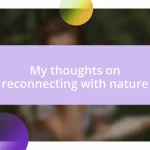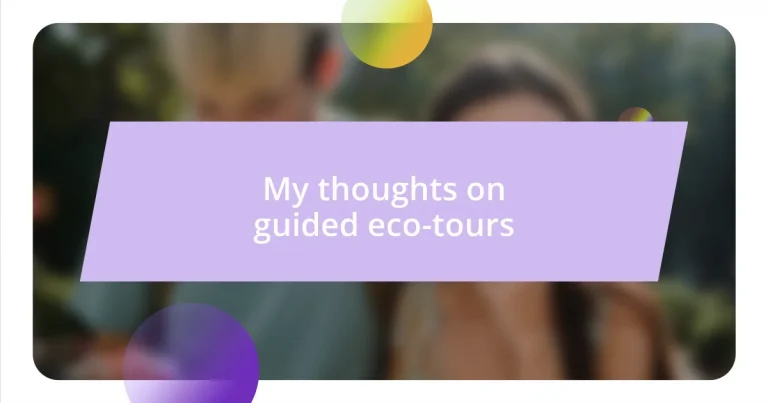Key takeaways:
- Guided eco-tours blend adventure and education, enhancing appreciation for nature while fostering a sense of responsibility toward conservation.
- Key benefits include expert knowledge from guides, support for local communities and conservation efforts, and unique, immersive experiences that inspire personal growth.
- Choosing the right eco-tour involves aligning interests with the type of environment, researching responsible operators, and considering group size for a more personalized experience.
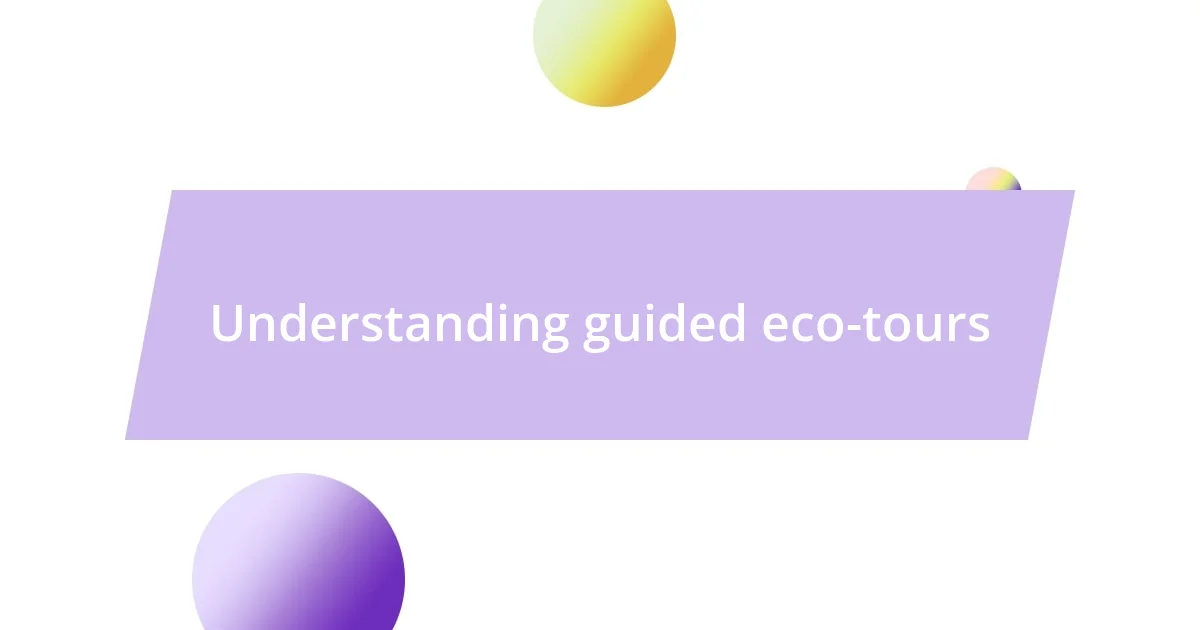
Understanding guided eco-tours
Guided eco-tours offer a unique blend of adventure and education, allowing participants to explore natural environments while learning about conservation and sustainability. I remember my first guided tour in a lush rainforest, where the guide’s passion for protecting the ecosystem was infectious. It wasn’t just a walk in the woods; it felt like a deep dive into the living world around me.
On these tours, expert guides often share fascinating insights about the local flora and fauna, highlighting their interconnections and the importance of preserving them. Have you ever wondered how much our actions impact these ecosystems? It’s eye-opening to realize that even small choices can contribute to larger environmental outcomes, especially when we hear real stories from knowledgeable guides who have dedicated their lives to this cause.
By participating in guided eco-tours, you’re not just an observer; you become part of a community focused on stewardship and awareness. I often found myself reflecting on my own habits and how I could contribute to conservation efforts, and that realization felt empowering. It’s an experience that not only enhances appreciation for nature but also instills a sense of responsibility for its future.
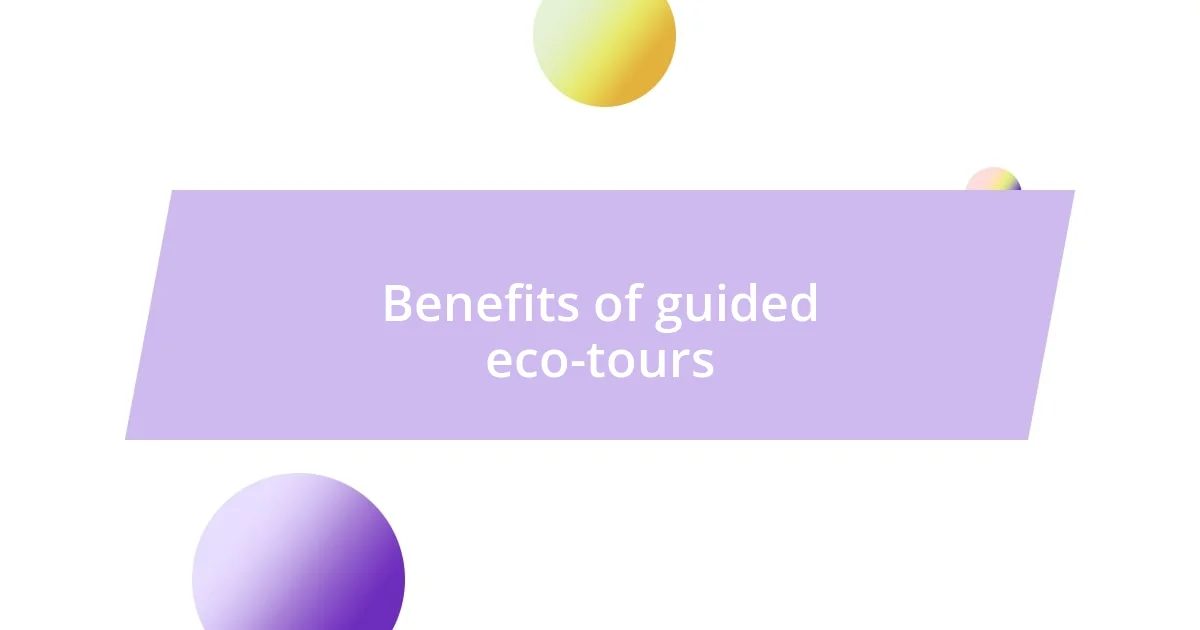
Benefits of guided eco-tours
Guided eco-tours present a wonderful opportunity to connect with nature while supporting local communities. I can still recall a trip to the coast where our guide, someone who lived in harmony with the land, shared stories about the traditional fishing techniques of the area. It transformed my understanding of sustainable practices and how cultural knowledge plays a crucial role in conservation efforts. Engaging with such passionate individuals can inspire participants to adopt more mindful behaviors.
Here are the key benefits of guided eco-tours:
- Expert Knowledge: Guides with specialized training enhance the learning experience, offering insights that you might miss exploring solo.
- Conservation Support: Many eco-tours contribute directly to conservation projects, helping protect the environments they showcase.
- Community Connection: Tours often support local economies, providing income and uplifting communities while fostering a respect for their natural resources.
- Personal Growth: Engaging with nature in a structured way encourages self-reflection and motivates individual action towards sustainability.
- Unique Experiences: Guided eco-tours often include exclusive access to hidden gems in nature that aren’t available to the general public.
On another occasion, I participated in a guided hike through a breathtaking mountain range. The guide not only pointed out various plant species but shared personal stories about how these plants had been used for generations. It deepened my appreciation for the landscape and made me ponder the interconnectedness of humans and nature. With each step, I felt a growing responsibility to protect these wonders. It’s these moments of realization that stay with you long after the tour has ended.
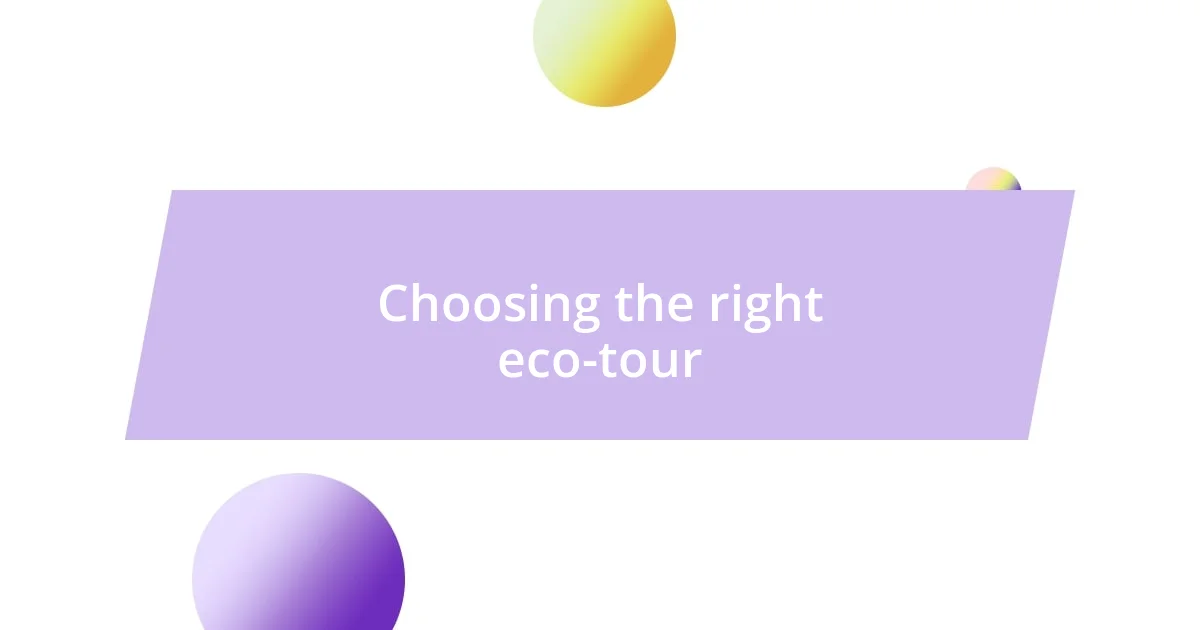
Choosing the right eco-tour
Choosing the right eco-tour involves understanding what resonates with you personally. For instance, I remember contemplating whether to go for a rainforest adventure or a desert experience. Each option offered its own allure, but I realized my heart leaned towards the rainforest, as the rich biodiversity and vibrant ecosystem had always fascinated me. So, I suggest you first consider your interests and the type of environment that excites you most.
Next, it’s crucial to research the tour operator’s mission and practices. I recall discovering a company that not only focused on eco-friendly practices but also actively participated in community development. It was refreshing to see their commitment to ensuring that local inhabitants benefited from the tourism they attracted. I believe that by choosing an operator dedicated to both the environment and local communities, you can ensure your adventure has a positive impact.
Lastly, evaluate the tour size and structure. During a trip I took with a small group, we had more opportunities for personalized experiences. It fostered deeper conversations with the guide and allowed us to explore areas that larger groups couldn’t access. So, when choosing a tour, think about whether you prefer a more intimate adventure where you can truly connect with nature and your fellow travelers.
| Factor | Considerations |
|---|---|
| Interests | Choose based on the environment that excites you, whether it’s a rainforest, desert, or coastal area. |
| Operator Responsibility | Research operators committed to eco-friendly practices and community development for a more impactful experience. |
| Group Size | Opt for smaller tours for personalized experiences and deeper connections with both the guide and nature. |
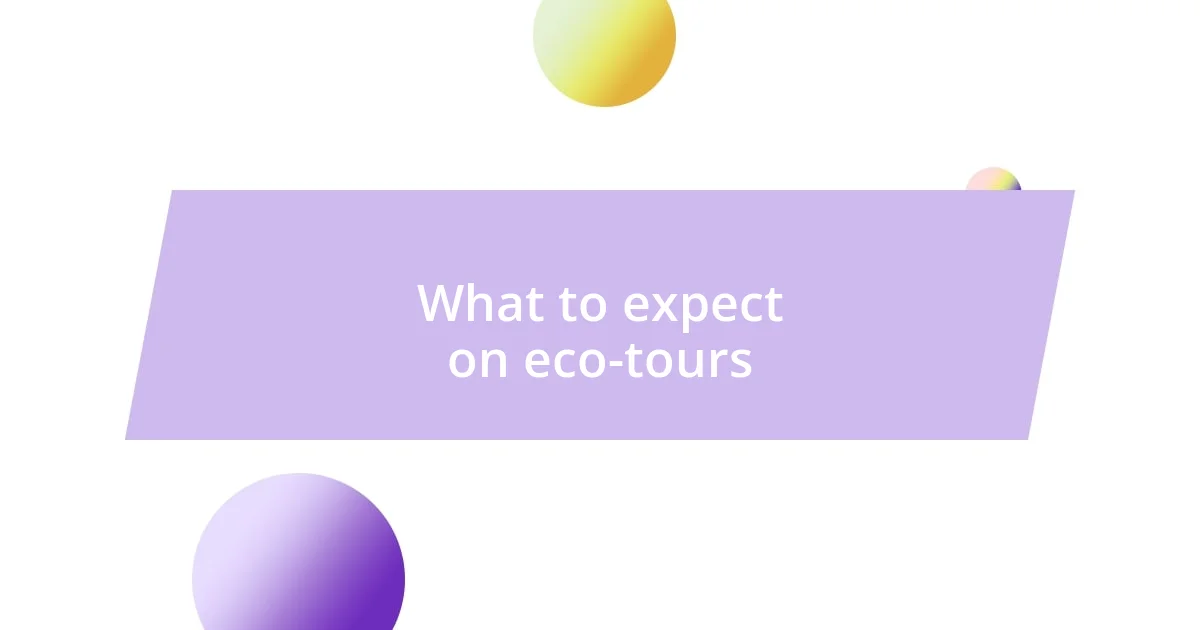
What to expect on eco-tours
When you embark on an eco-tour, expect an immersive experience that goes beyond simply observing nature. I remember my first eco-tour, where I found myself surrounded by the sounds of chirping birds and rustling leaves. It struck me how every detail, from the subtle fragrance of wildflowers to the vibrant colors of the landscape, contributes to a complex ecosystem. Really, have you ever paused to appreciate the little things? It’s these moments that deepen your connection to the environment.
Guided eco-tours often include hands-on activities that allow you to engage with nature more intimately. I once joined a tour where we participated in a beach clean-up, which was both humbling and exhilarating. Being part of a collective effort to preserve the beauty of that coastline filled me with a sense of purpose. This hands-on approach not only enriches your experience but also instills a lasting sense of responsibility toward the environment. Isn’t it fulfilling to know you’ve made even a small difference?
The emotional connection you’ll forge with the surroundings and your fellow travelers can be surprising. On one trip, I shared meals with strangers who quickly became friends, bonding over shared experiences and laughter by a campfire. Those conversations, tinged with shared awe at nature’s beauty, often lead to deeper reflections on our role in protecting these spaces. Have you ever felt that sense of community while exploring the outdoors? It’s this camaraderie that I cherish long after the tour has concluded.
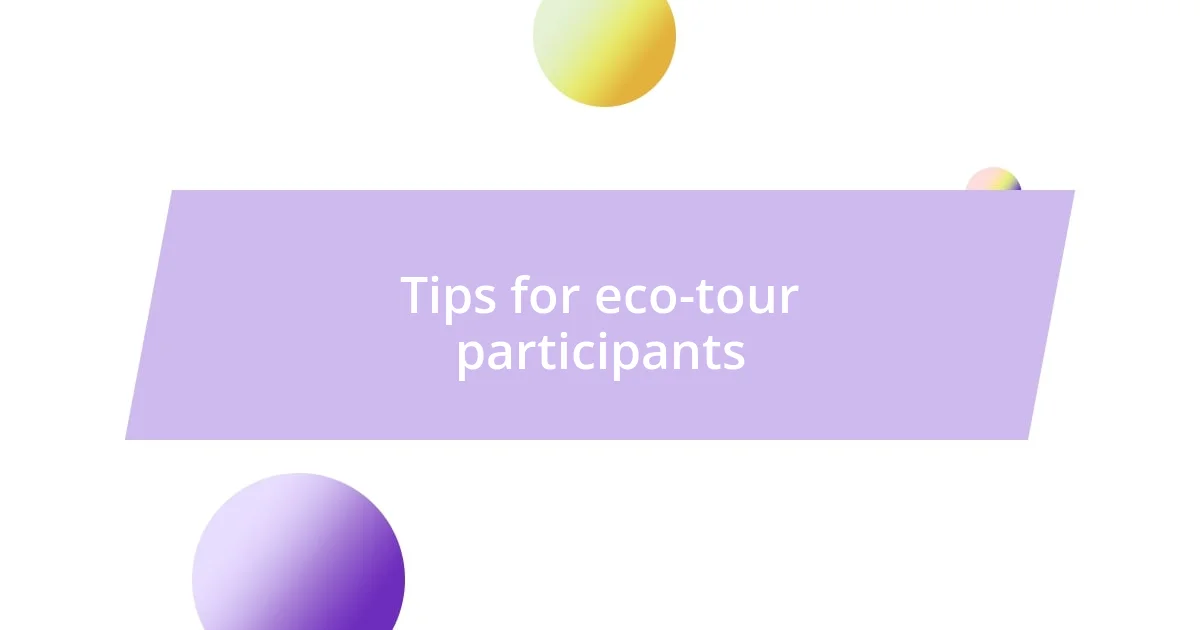
Tips for eco-tour participants
Participating in an eco-tour can be a transformative experience, but being prepared enhances that journey. When I went on my first guided walk through a mangrove forest, I didn’t realize how essential it was to wear appropriate footwear. The muddy trails were challenging, and I ended up with soggy shoes, which distracted me from fully enjoying the adventure. Trust me, prioritizing comfort will allow you to focus on the breathtaking surroundings and the rich wildlife.
Another important tip is to be open-minded and ready to learn. On a cultural eco-tour in a remote village, I was surprised by how much I enjoyed engaging with the locals. They shared their traditional practices and eco-friendly techniques for sustainable living, something I had never considered before. It left me wondering, how often do we overlook the wisdom of those who live in harmony with nature? Being receptive to the knowledge of others can deepen your understanding and appreciation of the ecosystem.
Practicing mindfulness during your eco-tour can amplify your connection with nature. I vividly remember sitting quietly beside a tranquil river, allowing the sounds of water flowing and birds singing to wash over me. Have you ever taken a moment to just breathe and absorb your surroundings? I found that these moments of stillness can reveal the hidden beauty of a place and connect you more closely to the environment and its rhythms. Embrace the quiet, and you might uncover an entirely new perspective on your journey.

Responsible travel practices
When practicing responsible travel, I think it’s essential to prioritize how our actions impact the local community and environment. On one trip, I consciously chose to support local businesses rather than large corporations, and the experience was incredibly rewarding. I enjoyed regional delicacies at family-run restaurants, which not only tantalized my taste buds but also allowed me to interact with local culture. Isn’t it amazing how our choices can weave us into the fabric of a destination?
Honestly, I always try to leave no trace while visiting these beautiful spots. During a hike in a national park, I made it a point to carry out any litter I came across, even if it wasn’t mine. The smiles from fellow hikers and the appreciation from park rangers reminded me that each small act contributes to protecting these environments for future generations. Have you thought about the simple ways your actions could positively influence these cherished places?
Educating myself about the ecological and cultural significance of the areas I visit has transformed the way I travel. I recall attending a local workshop on sustainable tourism practices while on a guided tour, which opened my eyes to the delicate balance of maintaining natural resources while respecting local traditions. It made me wonder, how can we enjoy these incredible experiences while ensuring future travelers can experience them too? Engaging in these conversations deepened my appreciation for responsible tourism and highlighted the importance of becoming informed advocates for preservation.
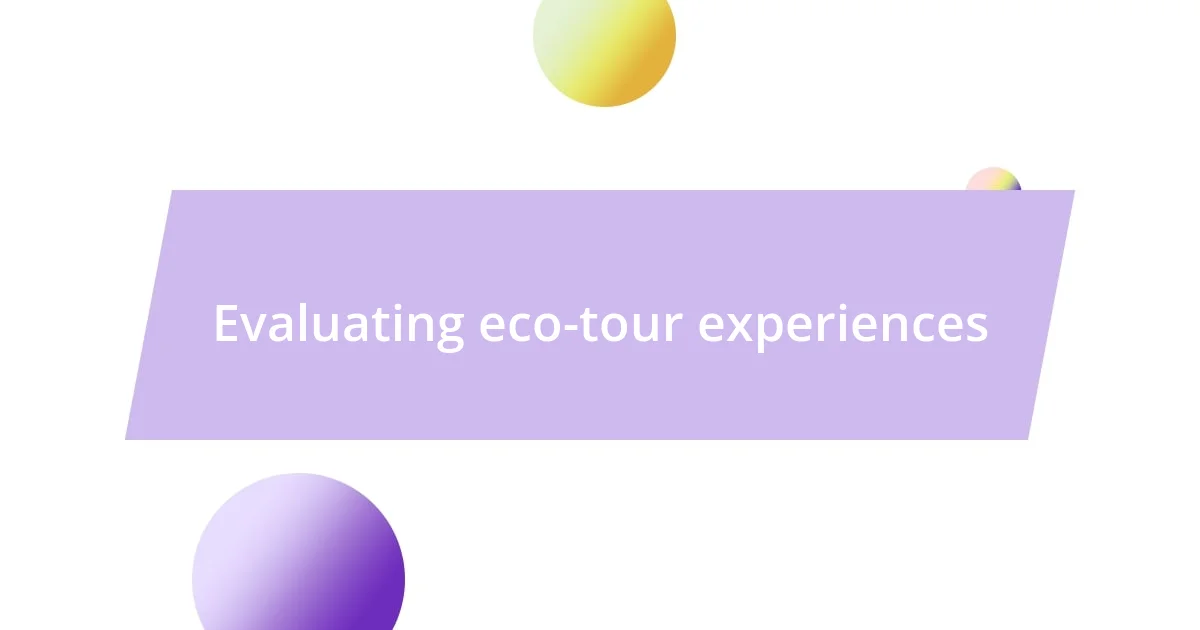
Evaluating eco-tour experiences
Evaluating eco-tours can be both an art and a science. From my experience, the most telling indicators of a quality eco-tour lie in the tour guide’s knowledge of the ecosystem. During one tour, my guide not only detailed the local flora and fauna but also shared heartwarming stories about conservation efforts in the community. It left me pondering: How can we trust someone who lacks a genuine connection to the environment they’re introducing us to?
Going beyond facts, I think it’s crucial to assess how an eco-tour impacts local communities. I once participated in a tour where a portion of the fees went directly into community projects. Witnessing the locals’ faces light up as they explained the positive changes implemented by these funds gave me a profound sense of satisfaction. Isn’t it fulfilling to know your adventure contributes to something bigger, something that supports the very people who call these places home?
Lastly, I believe the level of personal reflection after a tour speaks volumes about its value. After an immersive experience in a lush rainforest, I found myself journaling for days, reflecting on the interconnectedness of all living things. Have you ever left a journey feeling more attuned to the world around you? This personal growth is a true measure of an eco-tour’s influence, and it can transform not just your travel experience but your entire perspective on life.
